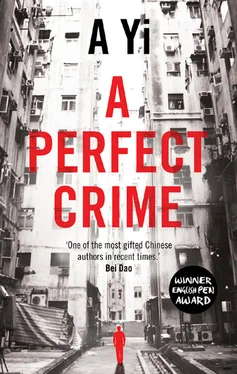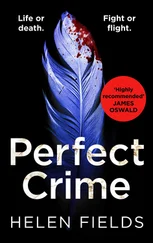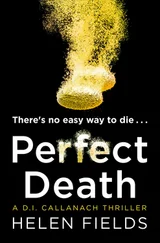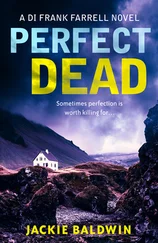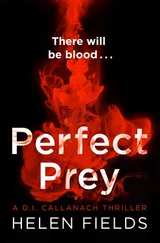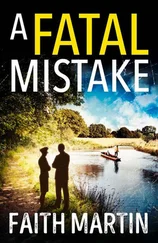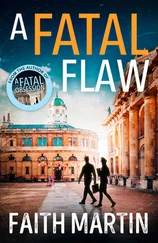‘Relax,’ he said. ‘I’m not a policeman and I don’t work for the judiciary. I have no legal right to punish or incarcerate you and I’m not here to pass judgement. I’m an old man of sixty-four and you are only nineteen, but here we are equals. I want us to talk, open up. Fate has brought us together.’
I took his business card:
VICE-PRESIDENT OF THE CITY EDUCATION
ASSOCIATION
MEMBER OF THE PROVINCIAL FAMILY EDUCATION
RESEARCH UNIT
He watched me read it, then said, ‘I’m just an ordinary citizen.’
He took out a packet of cigarettes and asked if I wanted one. I accepted without saying anything and he leaned over to light it. I remembered a film I saw once where a man lit a cigarette like this and was then captured by the prisoner and taken hostage himself. The lighter wouldn’t produce a flame, but he kept flicking patiently. I was starting to like him. Maybe I could tell him some personal things. The thought was a beautiful one, in the same way mathematics is beautiful and in that beauty you can find comfort. I needed the right person to listen. I just wanted him to listen.
He took a pile of loose papers from his briefcase, licked his finger and began flicking through them. They were covered in red notes. He put some to one side. He carried on like this for some time. I smoked alone. It was my first cigarette in ages and I was surprised by the taste. It almost tasted of shit. I felt dizzy, like I’d been drinking cheap booze. The sun came flooding through the window. I’d been longing for it while alone in my cell, but now I just felt hot and itchy.
Eventually he finished tidying the papers on the table, looked up. ‘Uh huh.’ He pinched the fingers of his left hand together (as if catching a mosquito) and spoke.
‘Do you think this kind of incident is an exception or quite common in today’s society?’
‘An exception.’
‘Uh huh. It does seem to be an exception, but in fact exceptionality and normality are united in their opposition. Normal behaviour contains abnormal behaviour and exceptional incidents embody society’s norms. We must find the reason here.’
The chances of us talking had been ruined. He was right, but it was the kind of right that gave no moral nourishment. I had no idea what he was doing here, other than showing off his education. He was like an old sheep, soft and warm, kind-looking. He could have decided to be a good listener.
Suddenly he asked me who I lived with before the age of five.
‘Grandpa and Grandma.’
‘What did they give you?’
‘Love.’
‘What kind of love?’
‘Unconditional. They spoilt me.’
‘To what degree?’
I began talking, it flowed out, moving stories of their love. His pen moved quickly. In the gaps between my stories he drew lines in his papers, as if solving a mathematical problem. He wanted answers and that made me despise him. If he’d given the matter two seconds’ thought, he would have realised no one could have such clear memories of life before they turned five. I reminisced about my short life just as he requested: when I went back to live with my parents, when I left again, my moves between schools in the village, county town and provincial capital, the pressures and troubles that had brought me to my critical juncture.
‘Do you think leaving the life in which you were the object of your grandparents’ love was beneficial or detrimental to you?’
‘It did much more harm than good. It’s essentially the reason I killed Kong Jie.’
He was jumping with excitement, as was his pen on the page. He made one last stab in his notes. Full stop. He took to his feet like a scientist who had discovered a new wonder cure or a writer who had just finished his masterwork. Caught in the ecstasy of creation. He would probably have embraced me had it not been for the armed police in the room. Controlling himself, he feigned a pained expression.
‘You, son, are a typical case of a fallen prince.’
‘No, I’m the redeemer.’
I brushed him away, my heart filled with loathing and bitter disappointment.
Two days later I was led once again into the meeting room with the same camera set up. I felt an overwhelming weight, like I was standing high up on a stage, my lapels fluttering in the wind, and thousands of expectant faces looking up at me. I was used to straightening my hunched spine, putting on a show of spiritedness, but not capriciousness. It was a painstaking performance, a completely different me.
The person sitting before me, trying to make me feel comfortable, was a female journalist. The table had been removed, there was nothing between us. She had short, permed hair, alabaster skin and an ever so slightly plump, round face. She wore a hemp-grey Western suit jacket and navy skirt. She was leaning forward, her fingers criss-crossed and placed on her raised knees, smiling (as if smiling was the mouth’s only function). Her chin was raised, ever so slightly looking up. Her eyes never left me.
It was like being cursed. I felt a sudden urge to plead with her. I was awaiting her instructions.
‘Don’t think about the camera,’ she said.
‘Uh huh.’
I was shy. Her teeth were white and straight, the tone of her voice warm, like a breeze flitting through leaves, deep and richly magnetic. Every word was itself a form of clarity.
She passed me the morning paper. The vice-president of the City Education Association had concluded that there were three contributing factors as to why I had committed murder:
1. A failure in my upbringing.
2. Pressure resulting from the college entrance exams.
3. Negative societal influence.
He finished with more nonsense, meant to prevent
similar incidents in the future:
1. Understanding and comprehension.
2. Attention and patience.
3. Equality and reciprocity.
‘What do you think?’ she asked me.
‘Bullshit.’
I already knew what she wanted. She smiled broadly.
‘Then why do you think you did it?’
‘Diversion. I’d say diversion.’
‘What did you want diversion from?’
She nodded, her eyes leading me on. I was desperate to speak. I began telling her the truth, one sentence, two sentences, but then in burst a middle-aged man (like a lion trespassing into our territory, she was my lioness). He was clutching a piece of paper which she read, reclined in her seat and exchanged meaningful looks with him as he left.
That was it, it was over, whatever there had been between us. I shut my mouth.
‘Diversion from what?’ she asked with a heavy heart, having seemingly forgotten my earlier explanation.
‘Nothing,’ I said.
Then I said, ‘For a moment, you reminded me of my cousin.’
She liked this and leaned forward again. It was the most hypocritical thing I’d ever witnessed. To think I’d thought her worth trusting, just like my cousin. Now I could see that supposed sincerity for what it was, a superficial technique. She was trying to cheat an answer out of me. Everything was leading to this; even her dress and make-up were carefully chosen to this end. As soon as I’d given her what she wanted, she would leave, high- fiving her colleagues on a job well done.
‘Please continue with what you were saying,’ she said.
‘I’ve got nothing to say,’ I said.
The atmosphere became frosty and she wasn’t expecting it. In one last-ditch attempt, she started an onslaught of ridiculous questions.
‘What does it feel like to be sent away from home?’
‘It’s not what you’re thinking, I wasn’t constantly burning with anger.’
This was possibly my last offer of kindness, but she didn’t take it. Instead she rushed to the next question.
‘What was it that stopped you from putting the fire out?’
Читать дальше
